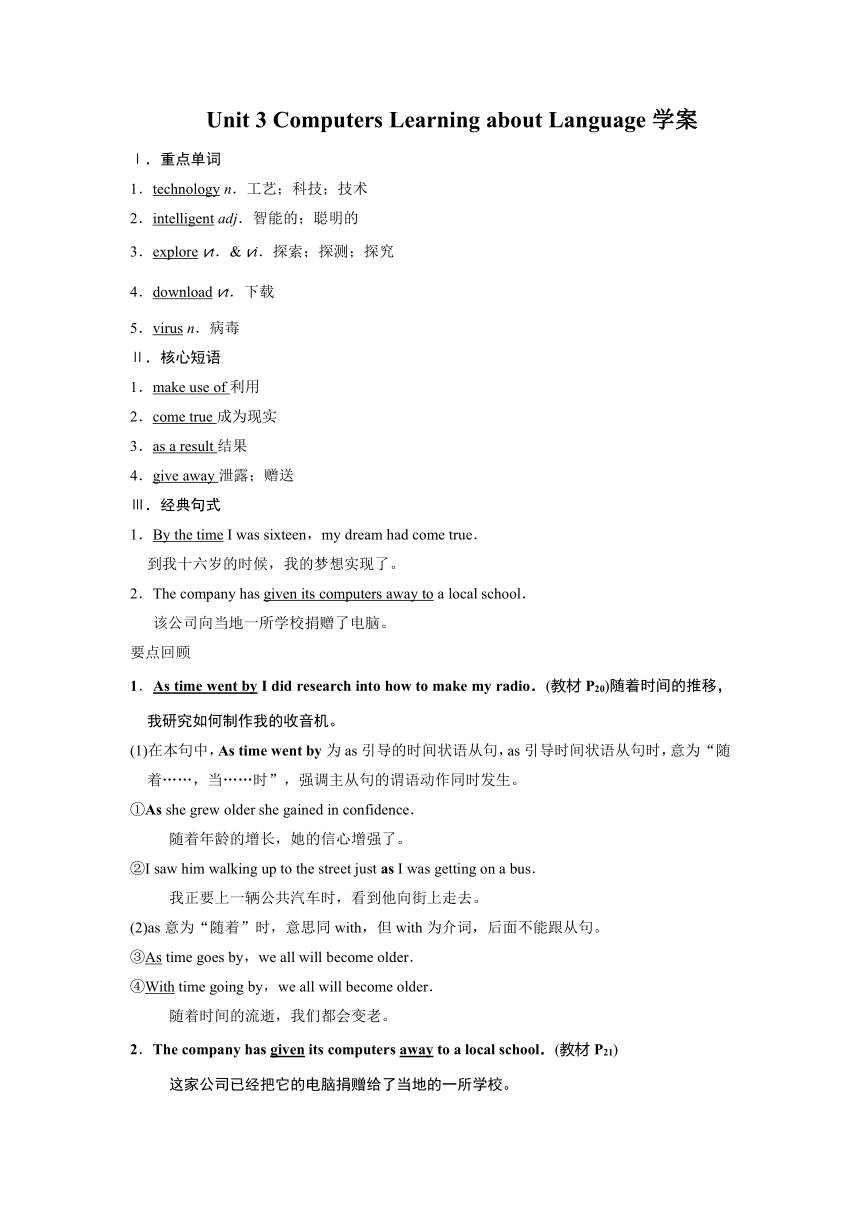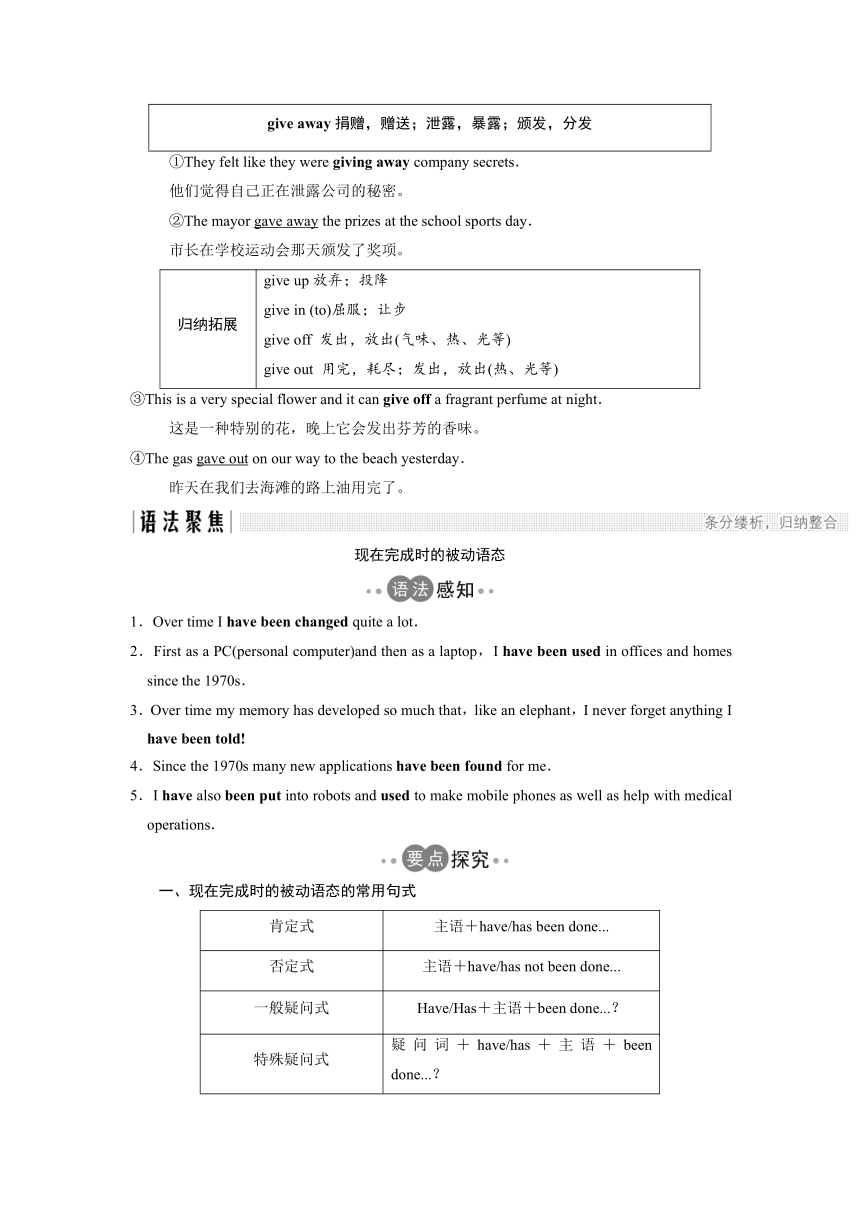人教版必修二Unit 3 Computers Learning about Language学案
文档属性
| 名称 | 人教版必修二Unit 3 Computers Learning about Language学案 |  | |
| 格式 | docx | ||
| 文件大小 | 59.1KB | ||
| 资源类型 | 教案 | ||
| 版本资源 | 人教版(新课程标准) | ||
| 科目 | 英语 | ||
| 更新时间 | 2021-01-11 17:24:37 | ||
图片预览


文档简介
Unit 3 Computers Learning about Language学案
Ⅰ.重点单词
1.technology n.工艺;科技;技术
2.intelligent adj.智能的;聪明的
3.explore vt.& vi.探索;探测;探究
4.download vt.下载
5.virus n.病毒
Ⅱ.核心短语
1.make use of利用
2.come true成为现实
3.as a result结果
4.give away泄露;赠送
Ⅲ.经典句式
1.By the time I was sixteen,my dream had come true.
到我十六岁的时候,我的梦想实现了。
2.The company has given its computers away to a local school.
该公司向当地一所学校捐赠了电脑。
要点回顾
1.As time went by I did research into how to make my radio.(教材P20)随着时间的推移,我研究如何制作我的收音机。
(1)在本句中,As time went by为as引导的时间状语从句,as引导时间状语从句时,意为“随着……,当……时”,强调主从句的谓语动作同时发生。
①As she grew older she gained in confidence.
随着年龄的增长,她的信心增强了。
②I saw him walking up to the street just as I was getting on a bus.
我正要上一辆公共汽车时,看到他向街上走去。
(2)as意为“随着”时,意思同with,但with为介词,后面不能跟从句。
③As time goes by,we all will become older.
④With time going by,we all will become older.
随着时间的流逝,我们都会变老。
2.The company has given its computers away to a local school.(教材P21)
这家公司已经把它的电脑捐赠给了当地的一所学校。
give away捐赠,赠送;泄露,暴露;颁发,分发
①They felt like they were giving away company secrets.
他们觉得自己正在泄露公司的秘密。
②The mayor gave away the prizes at the school sports day.
市长在学校运动会那天颁发了奖项。
归纳拓展
give up放弃;投降
give in (to)屈服;让步
give off 发出,放出(气味、热、光等)
give out 用完,耗尽;发出,放出(热、光等)
③This is a very special flower and it can give off a fragrant perfume at night.
这是一种特别的花,晚上它会发出芬芳的香味。
④The gas gave out on our way to the beach yesterday.
昨天在我们去海滩的路上油用完了。
现在完成时的被动语态
1.Over time I have been changed quite a lot.
2.First as a PC(personal computer)and then as a laptop,I have been used in offices and homes since the 1970s.
3.Over time my memory has developed so much that,like an elephant,I never forget anything I have been told!
4.Since the 1970s many new applications have been found for me.
5.I have also been put into robots and used to make mobile phones as well as help with medical operations.
一、现在完成时的被动语态的常用句式
肯定式
主语+have/has been done...
否定式
主语+have/has not been done...
一般疑问式
Have/Has+主语+been done...?
特殊疑问式
疑问词+have/has+主语+been done...?
He has been admitted to the club.
他已被接纳为俱乐部成员了。
Tom's novel has not been published.
汤姆的小说还没有被出版。
Has his bike been repaired?
他的自行车修好了吗?
Who has been invited?
谁受到了邀请?
二、现在完成时的被动语态的用法
1.表示被动的动作在说话之前已经完成,强调过去的动作对现在造成的影响或产生的结果,通常与already,yet,never,recently等副词及时间状语so far,by now,up till now,since等连用。
The room has already been cleaned.
这个房间已经被打扫干净了。(现在已经不用打扫房间了)
2.表示一个被动的动作或状态从过去开始一直持续到现在,并可能继续持续下去,常与for或since等引出的时间状语(从句)连用,或用于how long引出的句子中。
The machine has been repaired for two hours.
这台机器已经被修两个小时了。(可能还会继续被修)
3.用在条件状语从句中,表示将来某时已经完成的动作。
You shouldn't leave school before your homework has been finished.
在你的作业没完成之前你不应该离开学校。
三、使用现在完成时的被动语态要注意6点问题
1.与一般过去时的被动语态的区别。一般过去时的被动语态所表示的动作或状态与现在的情况没有联系,而现在完成时的被动语态则强调与现在的情况有联系。
The park was opened to the public last year.
去年这家公园向公众开放。(说明动作发生于过去)
The park has been opened to the public.
这家公园已向公众开放。(说明动作发生于过去,但对现在有影响,即现在公园已经开放了)
2.非延续性动词,如borrow,finish,begin,start,buy,marry,open,join等构成的现在完成时的被动语态不能与表示一段时间的状语连用。若要表达相应的意思,则要改换动词或时态。
The work was finished two weeks ago.
这项工作在两周前已经完成。
The work has been finished.
这项工作已经完成。
3.短语动词是一个不可分割的整体,在被动语态中要保持完整性,其中的介词或副词不可省略。
It is said that the problem has been looked into.
据说已经调查了这个问题。
4.只带有一个宾语的动词变为被动语态时,将主动语态的宾语变为被动语态的主语。
We have built many houses in the past ten years.
→Many houses have been built in the past ten years.
5.带有双宾语的动词,如give,send,bring,take,teach,show,tell,make,sing,write,read,sell,buy,tell,pay,lend,pass,promise等,变为被动语态时,可将其中一个宾语变为主语,另一个保留不动。
We have given him the book.
→He has been given the book.
→The book has been given to him.
6.带有复合宾语的动词变为被动语态时,只能将宾语变为主语,原来的宾补改为主语补足语。原来省略to的不定式作宾补的,被动语态中要用带to的不定式。
I have told them to help you.
→They have been told to help you.
Ⅰ.重点单词
1.technology n.工艺;科技;技术
2.intelligent adj.智能的;聪明的
3.explore vt.& vi.探索;探测;探究
4.download vt.下载
5.virus n.病毒
Ⅱ.核心短语
1.make use of利用
2.come true成为现实
3.as a result结果
4.give away泄露;赠送
Ⅲ.经典句式
1.By the time I was sixteen,my dream had come true.
到我十六岁的时候,我的梦想实现了。
2.The company has given its computers away to a local school.
该公司向当地一所学校捐赠了电脑。
要点回顾
1.As time went by I did research into how to make my radio.(教材P20)随着时间的推移,我研究如何制作我的收音机。
(1)在本句中,As time went by为as引导的时间状语从句,as引导时间状语从句时,意为“随着……,当……时”,强调主从句的谓语动作同时发生。
①As she grew older she gained in confidence.
随着年龄的增长,她的信心增强了。
②I saw him walking up to the street just as I was getting on a bus.
我正要上一辆公共汽车时,看到他向街上走去。
(2)as意为“随着”时,意思同with,但with为介词,后面不能跟从句。
③As time goes by,we all will become older.
④With time going by,we all will become older.
随着时间的流逝,我们都会变老。
2.The company has given its computers away to a local school.(教材P21)
这家公司已经把它的电脑捐赠给了当地的一所学校。
give away捐赠,赠送;泄露,暴露;颁发,分发
①They felt like they were giving away company secrets.
他们觉得自己正在泄露公司的秘密。
②The mayor gave away the prizes at the school sports day.
市长在学校运动会那天颁发了奖项。
归纳拓展
give up放弃;投降
give in (to)屈服;让步
give off 发出,放出(气味、热、光等)
give out 用完,耗尽;发出,放出(热、光等)
③This is a very special flower and it can give off a fragrant perfume at night.
这是一种特别的花,晚上它会发出芬芳的香味。
④The gas gave out on our way to the beach yesterday.
昨天在我们去海滩的路上油用完了。
现在完成时的被动语态
1.Over time I have been changed quite a lot.
2.First as a PC(personal computer)and then as a laptop,I have been used in offices and homes since the 1970s.
3.Over time my memory has developed so much that,like an elephant,I never forget anything I have been told!
4.Since the 1970s many new applications have been found for me.
5.I have also been put into robots and used to make mobile phones as well as help with medical operations.
一、现在完成时的被动语态的常用句式
肯定式
主语+have/has been done...
否定式
主语+have/has not been done...
一般疑问式
Have/Has+主语+been done...?
特殊疑问式
疑问词+have/has+主语+been done...?
He has been admitted to the club.
他已被接纳为俱乐部成员了。
Tom's novel has not been published.
汤姆的小说还没有被出版。
Has his bike been repaired?
他的自行车修好了吗?
Who has been invited?
谁受到了邀请?
二、现在完成时的被动语态的用法
1.表示被动的动作在说话之前已经完成,强调过去的动作对现在造成的影响或产生的结果,通常与already,yet,never,recently等副词及时间状语so far,by now,up till now,since等连用。
The room has already been cleaned.
这个房间已经被打扫干净了。(现在已经不用打扫房间了)
2.表示一个被动的动作或状态从过去开始一直持续到现在,并可能继续持续下去,常与for或since等引出的时间状语(从句)连用,或用于how long引出的句子中。
The machine has been repaired for two hours.
这台机器已经被修两个小时了。(可能还会继续被修)
3.用在条件状语从句中,表示将来某时已经完成的动作。
You shouldn't leave school before your homework has been finished.
在你的作业没完成之前你不应该离开学校。
三、使用现在完成时的被动语态要注意6点问题
1.与一般过去时的被动语态的区别。一般过去时的被动语态所表示的动作或状态与现在的情况没有联系,而现在完成时的被动语态则强调与现在的情况有联系。
The park was opened to the public last year.
去年这家公园向公众开放。(说明动作发生于过去)
The park has been opened to the public.
这家公园已向公众开放。(说明动作发生于过去,但对现在有影响,即现在公园已经开放了)
2.非延续性动词,如borrow,finish,begin,start,buy,marry,open,join等构成的现在完成时的被动语态不能与表示一段时间的状语连用。若要表达相应的意思,则要改换动词或时态。
The work was finished two weeks ago.
这项工作在两周前已经完成。
The work has been finished.
这项工作已经完成。
3.短语动词是一个不可分割的整体,在被动语态中要保持完整性,其中的介词或副词不可省略。
It is said that the problem has been looked into.
据说已经调查了这个问题。
4.只带有一个宾语的动词变为被动语态时,将主动语态的宾语变为被动语态的主语。
We have built many houses in the past ten years.
→Many houses have been built in the past ten years.
5.带有双宾语的动词,如give,send,bring,take,teach,show,tell,make,sing,write,read,sell,buy,tell,pay,lend,pass,promise等,变为被动语态时,可将其中一个宾语变为主语,另一个保留不动。
We have given him the book.
→He has been given the book.
→The book has been given to him.
6.带有复合宾语的动词变为被动语态时,只能将宾语变为主语,原来的宾补改为主语补足语。原来省略to的不定式作宾补的,被动语态中要用带to的不定式。
I have told them to help you.
→They have been told to help you.
